Colin Parton's Blog, page 10
January 30, 2021
Prologue
The young girl stared through the slit in the door. She could hear her mother crying inside. Then the man struck again. Myra’s mother fell to the ground, motionless. Blood seeped from a cut in the side of her face. The naked sailor stumbled to where his clothes lay in a heap by the door. He dressed as quickly as a drunken man can and lurched from the room into the night. Myra ran to her mother’s side. She did not move. The blood congealed on the floor making a strange pattern. A tear slid down Myra’s dirt encrusted face. She had seen her mother beaten before, but never in this way.
Myra whispered, “Mother.”
There was no reply from the crumpled corpse that lay on the floor. Tears ran freely down Myra’s face as she realized the truth. Her mother was dead. She had gone to the place she had heard the pastor mention once… Was it haven? Yes, that was it; her mother had gone to haven and would be safe there with God while she waited for Myra to join her. Myra cuddled up to the still-warm body of her mother and wept.
Myra awoke with a start. It was freezing in the little room where she had cried herself to sleep. As she wiped the sleep from her eyes she remembered the dreadful incident of the night before. Trembling she looked down. The body of her mother lay cold upon the wooden floor of the room. Myra stood. She held back a tear. It was no use crying anymore. Mother’s dead.
Myra moved slowly from the room and upon reaching the door she turned and took a final look at the face of the only person in the world that had ever loved her. Then she turned and was gone.
Myra stumbled down the street of Kalanai in the early-morning light. She pulled her rags tightly around her as a light breeze blew past. It was mid-winter, no time for an eleven-year-old girl to be out in the cold. Had she been any closer to the coast, she would have frozen to death.
A girl rummaged through a pile of garbage on the side of the road. The lamp light flickered as a small gust of wind blew by. No one would intrude upon her work. She was the orphan of the whore at the dockside out searching for food. There must be a better way, she thought slumping against the cobbles.
So far Myra had tried begging in the town square and from door to door, but most turned her away or just simply ignored her. She had made a few coins from a rich merchant who was obviously being reprimanded by his conscience for some past wrong.
As she turned the corner out of the square she spied a group of guards harassing some children.
“But sir, I’ve nothing to eat,” a young boy cried.
“We were just begging,” a girl of six or seven argued.
The guard cracked her across the face with back of his hand. The force of the blow sent her crashing into a stack of crates on the side of the street. The boy and the other two girls sprinted away. The girl wailed in terror, blood streaming from her face.
“Stop, stop, please stop,” she begged trying to crawl away. “We’ll never come back here again.”
The guard chuckled.
“I know you won’t.”
He kicked her with all his might. Myra flinched and stepped back into the shadows. The girl crumpled to the ground, gasping and wailing.
“Shut her up,” said one of the other guards.
The guard that had kicked her raised his heavy boot and brought it crashing down onto the girls head. There was a sickening crunch as ichor splattered over the ground.
“Look at that,” he said, displeased. “She’s gone and mucked up me boot.”
The callousness and brutality of the guards left Myra frozen in shock. She shrunk further into the shadows and watched the guards leave. Finally her terror subsided and she was able to think clearly again.
There’s no way I’m going to survive if I don’t find some other way to make money, Myra thought, dashing away from the scene.
Then the thought struck her. She would steal it. She waited until nightfall, putting as much distance between herself and the marketplace as she could. She moved to the doorway of a nearby house. She tested the door. It was bolted from the inside.
Maybe it’s better not to get in. Should I gain entry to the house then I would probably get caught anyway. But she couldn’t put the feeling aside. She reached for the window beside the door. It was open. A burst of adrenaline ran through Myra’s veins. Slowly she opened the window further. When it was open about halfway there was a loud screeching sound. She stopped. Frozen against the wall. Terror overtook her. She waited for what seemed like hours, listening for some hint of movement from inside the house. There was none. Myra slowly pulled herself onto the window ledge. She sat silently, observing the contents of the room by the light of the pale moon. Then a glint caught her eye: a golden candlestick-holder. She dropped into the room and landed on a squeaky floorboard. Myra heard a movement upstairs. She dashed across the room, grabbed the candlestick and jumped up onto the window ledge. Myra glanced over her shoulder. There was a light moving toward the room she had just left. She jumped to the ground, shutting the window noisily behind her. Then she was off down the street. Behind her she heard the owner of the house calling for the watch. But Myra had already disappeared into the night.
The following day she sat by the docks devouring a hot pastry. It was the first meal in a long while she’d purchased. Somehow it tasted better, even though it wasn’t her money that had bought it. She watched the dockworkers unloading crates from a warship, stolen from some unlucky merchant no doubt. They worked well together. The strongest among them helping the weakest. The small one was obviously the knot specialist as Myra saw him scale the trussed crates, releasing them with ease. Once they had finished the job they slapped each other on the back and divided up their pay. Myra never felt more alone. She longed to have what they had, longed to be part of something, to work for something where her contribution was important.
Myra continued this lifestyle of begging by day and stealing at night. Things went well for a while but then one night, while she was breaking into a noble’s house, a man emerged from the shadow under the lintel of the door. Myra stood amazed for she was sure that no one had stood there a moment earlier. Before she could react, the man was upon her with cat-like movements and had his hand over her mouth and knife to her throat.
“Don’t be a’feared little one. I’m not here to kill ya,” the man whispered into Myra’s ear. “Be wary for One Eye is watching you. Tread carefully for one misstep will bring you death. One Eye does not like people intruding on his domain. If you want to continue in this line of work you’d best join us, pay your fees and we’ll leave you be.”
With that he was gone.
Myra stood by the doorway, thinking on what had just happened. She knew that it was no coincidence. From what she knew One Eye was notorious in the city. She had not expected to be found out by him. She stood in indecision. She knew that if she did not heed this warning she would be killed. But Myra could not go back to her previous life. Then and there she made a decision: she would continue robbing until One Eye’s men returned.
She opened the window and climbed into the room. Instantly, a light came on and she was grabbed at. She dodged out of the way of the groping hands. Myra could make out a number of figures against the blinding light.
“You should’ve listened to the warning. Now you’ll suffer the consequences.”
One of the figures became more discernible and moved towards her. She must try and escape. There was a figure by the window telling her that route was blocked. Should she attack this figure that was moving methodically towards her? No. He was more than twice her size. He was now no more than three feet from her and closing. She was going to die. Panic took her. She ran from her assailant but as she turned her head hit something… A shelf. She could see it as she lay on the floor. It didn’t matter. She was going to join her mother in what she now correctly knew as heaven, not haven as she had previously thought… The world started to swim… someone was saying something… what was it… she could almost make out the word… through the watery world that she was floating into… yes… that was the word… stop…
When Myra awoke she found herself lying on straw in a small room. She attempted to sit up but as she moved the room began to swim. She lay back comforting her aching head on the straw. Myra looked around the room in which she lay. A window in the wall allowed a small amount of light to filter into the room. So this was heaven. The room was completely unfurnished but it was one of the best rooms Myra had ever slept in and so she was satisfied. But where was her mother?
She attempted to rise again and she found that the pain in her head had greatly subsided. She stood, cautiously touching the side of her head. Her hair felt sticky. When she brought down her hand she saw blood on it. If she was in heaven then why was she bleeding?
Before she could come to any conclusion the single wooden door to her room opened. A large man entered. He looked familiar but she couldn’t place where she had seen him. As soon as he spoke she remembered everything.
“Come on, it’s time for you to leave.”
The man helped her stand and led her out into the street.
“We couldn’t just kill you where you lay,” he said, answering her unasked question. “Let me give you some advice, leave town before you get yourself into trouble again.”
So that was it. Myra left town immediately. She had no ties in this world so one town was hardly different from another.
Myra continued from town to town for years learning the ways of the thief, and she did pay her guild price and only occasionally forgot to give them a percentage of her profits. Slowly she was moving up in the world. But she hated the guild almost as much as the guards of the towns. Thieves had no love for each other. There was no camaraderie. She was still alone.
Then, one day, just before the onset of winter that year, Myra was sitting in a bar enjoying the fruits of her recent night-time caper. A man approached her. He asked if he might join her. Myra showed no displeasure at this. Her life was a lonely one. The man introduced himself as Melkave. There was something very strange about him but Myra couldn’t put her finger on it.
She was about to introduce herself when the man spoke, “Myra, we need to talk.”
How did he know her name?
“Here is as good a place as any,” she replied, trying to hide her sudden shock.
He motioned for her to follow him to a table in the far corner of the tavern.
When they were seated he continued, “Myra Telleran, we have been monitoring you over the past few years and you have reached a level acceptable to gain entry to our organisation.”
Before Myra could say anything the man called for more ale to be brought to the table. When it arrived, he passed a tankard to Myra. She drank deeply; this evening was taking an unexpected turn. Not only had she never seen this man before, she had never heard her last name.
“Now,” the man said wiping froth from his lips, “I am from the Ebon Hand.”
Myra gasped. The Ebon Hand was the assassins’ guild feared as much by her own kind as by those that lay beyond the shores of their land.
“I will give you a choice,” Melkave continued. “You may choose, if you wish, to join us. But, before you choose, take this into account: you have just drunk a rather large dose of maranian, one of the more deadly poisons known to us. If you choose to join us then I will give you the antidote, if you don’t…”
Myra, left with very little choice replied, “I will join you.”
Chapter One
Myra left the inn with her instructions: she was to go to a hall that lay towards the east of the town. She was to arrive at midnight the following evening. By the way that the man had spoken it seemed as though the time was non-negotiable. During the day Myra gathered up her few belongings and placed them into the bag that she had made herself. At the appointed time she arrived at the hall. It was a large stone building that was carved straight out of the mountain. Cautiously she pressed on the heavy doors and looked into the hall. It was very dark inside and the few torches guttered as she opened the door. There was a dark stone table running the length of the hall. Apart from the doorway in which she stood there were no other exits. There were carvings on all the walls but even with her elven eyes she found it hard to make them out. The whole building had a surreal feeling that may have turned others away but enticed Myra to enter.
She stepped into the room and made sure that the door was left open. In her profession she had realized how important it was to have a quick exit. Then Myra noticed that on the end of the table closest to her there were: two curved daggers; a exquisite short bow; a small black cube similar to a dice; a quiver of dark fletched arrows; and a small vial of black liquid. Myra cautiously made her way to the table making no sound on the gravel floor. She assumed that the weapons on the table were hers so she gathered them up. An instant later a black arrow ricocheted off the table where her hand had been a moment before. Myra’s head shot up, her eyes searching the back of the room from where the arrow had flown. A glint of light on metal caught her eye, high up in the shadows of the back right-hand corner of the room. Some inner sense told Myra to dive for cover. As she rolled over the cold gravel floor she felt something brush past her head. With a quick glance she saw another arrow clatter to the floor where she had been standing. She rolled behind an outcrop of rock, one of the many that protruded into the room. Myra crouched silently, trying to catch her breath. Then she remembered the bow she had just received. She notched an arrow onto the string. Slowly she raised her head above the black obsidian. She aimed the arrow where the glint had been and released it. There was a loud clatter as it hit the far wall and fell to the ground. Myra cursed, even though there had been little chance of it striking home.
She put the bow over her shoulder and drew the two daggers. Carefully Myra raised herself over the rock and moved down the wall towards her adversary. She stopped every few seconds to see if she could make out the form of her attacker. When she was about halfway down the hall she heard a tiny noise: the sound of a boot crunching on the gravel floor. In front of her the silhouette of a man stepped forward. Myra melted into the shadows. When the figure moved by her she spun behind him and placed one dagger against his throat and held the other back.
“Why are you firing on me?”
“I was sent to test you,” he paused and glanced at the dagger pressed against his skin. “It would seem you passed.”
Myra released the pressure of her dagger.
“Come with me,” he said, leaving the room.
Myra moved along behind him at a half jog to keep up with his long strides. He weaved up and down alleys and Myra had soon lost any sense of where they were.
He ducked down a short flight of stairs that Myra had hardly noticed a moment before. He made an odd knock at the door and it was swiftly opened for them. As Myra entered the room she was met with an incredible sight. Beyond the entrance hall there was a large open training area where black-clad men and women were training with many different weapons. At the far end of the room there was even an archery range. There were many doors leading off the training area. Myra could only guess what lay behind these. The place was huge, it must have taken up the whole city block.
The man she had followed led her to a side room which had two chairs and a bench.
“In here,” he pointed. “Once you’re marked we will begin your training.”
“Marked?”
The man rolled up his sleeve to reveal a black fist on his forearm.
“By this we know each other.”
A hunchbacked old man entered the room and gestured for her to sit.
“Now you’re a beauty aren’t you,” he said, unrolling a leather sheet he had carried in. Secured inside it were a number of sticks that looked like paintbrushes and vials of black liquid. Myra rolled up her sleeve and sat, examining the paintbrushes. Instead of bristles there were a row of needles secured to the end of the wood. The old man dragged the other chair over to where Myra sat and unstopped one of the vials. He dipped the tip of the needles into it and turned his attention to Myra’s arm.
“Hold still,” he said with a smile, and began an angular sharp jabbing motion.
Myra flinched slightly at the first prick but soon became accustomed to the feeling. After about an hour Myra had an almost identical black fist to the one on the man’s forearm who stood by the door.
“Now give it a few weeks to heal.”
“Myra, come with me.”
“You know my name, what’s yours?” she said walking after him.
“Taegen,” he led her to the archery range. “Now your skills with the bow weren’t the worst I’ve seen but it’s clear you’ve never picked one up before today.”
Taegen showed her how to hold the bow; how to knock an arrow and line up her target.
Over the next few weeks Taegen and Myra were never far apart as he taught her the skills she would need as part of the most feared assassins’ guild in the world. She had little to no fighting knowledge but she picked up these skills quickly. Myra learned of poison craft, of how to disable a man with a drop of liquid and how to kill him with the same. When it came to the art of stealth he knew that Myra would soon have no equal. Never had he met someone who could so easily disappear from sight. Her movements were lithe and if she didn’t want you to hear her, you never would.
Myra’s last piece of training related to her last piece of equipment, the black die that she had puzzled over ever since acquiring it. She learned that it was a decipherer. It was a magical device encoded by the hand’s magi. It worked by running the die over the encoded text. It would display the decoded text in the air in front of the reader. Not much help for the illiterate Myra but they let her keep it anyway, as she would have to learn to read. On all things Taegen and Myra agreed but this was not one. Myra could not see the use for it as an assassin. After one of their many disagreements over it Taegen decided to let it rest.
After a month of rigorous training Taegen told her that she had been chosen as part of a group to fulfil a mission for the shadow queen herself. A group of five assassins were to infiltrate the target’s manor and execute him without alerting his guards or his household. Myra looked around at the four other assassins that were part of the briefing with her. These people were going to rely on her, her skills and abilities were going to mean their success or failure. She felt trepidation, worried that she would not live up to the task. But she had no time to let the concern grow. As they left the room night was falling and they were off.
The target’s house was on the northern side of the city, a fair journey from here. They moved silently, dashing from shadow to shadow. As they skittered through the city they were forced to avoid patrol after patrol until they finally arrived at the walled mansion where their quarry lay. They waited, watching the guard on the wall, trusting their brother who had scouted the area for a week prior. Then, as expected, the guard went back into the house. A nod went up and down the line. As one the grappling hooks flew through the air and up onto the parapets. It took them but a few moments to climb onto the wall. From their vantage point in the shadows they could see the guards at the gate below. The garden between them and the house was empty, eerily silent on the moonless night. Myra descended to the ground, not far from the guards. She stepped silently up behind them and nicked their skin with her doused blades. They instantly collapsed to the ground.
Moments later her group were on the ground beside her, moving through the trees. They were soon at the house, at a window far from the light on the upper floor. One of the assassins was working on the lock and soon had the window ajar. He moved it slowly to avoid any unwanted sound. Their padded feet silently touched the floor of the hall. The layout of the building ran through Myra’s head. They separated, two to the right, two to left and one up the stairs. Those that stayed on the ground floor quickly reconvened at the base of the stairs and nodded to the man upstairs, who hung silently in an alcove at the top. He dropped to the floor and was away, those below him dashing up the carpeted stairs.
They split up again on the top floor. Myra and her accomplice were to ensure the children stayed in their room. Within moments they were hovering around the beds of the sleeping babes. They counted, waiting for the appointed time. Then they were off again. Meeting at the top of the stairs. The man who had waited at the top nodded, sheathing his dagger. He took his position above the hall as the rest descended, should they be followed he would be ready. As they reached the bottom he dropped once more and followed them to the garden. One by one they dove through the open window. Myra waited for the man to reach the portal. When he was through she slowly, silently closed and re-locked the window. They were across the garden, up the walls and back into the streets.
It took no more than thirty minutes for them to be in an out. Myra’s team had worked like a well-oiled machine and she was part of that machine. She brimmed with pride. Silently cheering to herself as they made their way back to the compound. That night they celebrated. Myra had found her place. She was an assassin, a trusted member of the feared Ebon Hand.
In the coming days Taegen pulled Myra aside from her training, telling her that she had been selected for another mission. This time, alone. He told her it would be a long journey and to be prepared. She must be at the docks at midnight tomorrow to await further instructions. They hugged, Myra sad to be leaving, Taegen proud of his student.
The next night she arrived at the docks early. There was an elf dressed all in black standing alone who seemed to be watching her. She entered one of the many dockside taverns and waited, keeping an eye on him. After ten minutes the man came in and sat with Myra.
“Are you ready for your journey?”
“Yes.”
“Here,” he said, placing a piece of parchment on the table in front of her.
“I can’t read,” she said pushing the parchment back across the table.
“That is something that you’ll have to change,” the man said taking back the paper. “It reads,” he said as he unravelled the sheet, “you must travel to an island of the humans. Once you arrive you’re required to make a map of the land, major cities, ports, as well as garrison strengths. You will have adequate time to complete this task before we come and get you. Take this,” her gave her a tiny, ornate black box. “Give it to the first elf of the light you come across. That’s your ship,” he said pointing at a raiding vessel moored at the dock. “You will board the vessel now and the captain will give you further instructions.”
He glanced around quickly.
“Go now.”
Myra stood and walked out of the tavern and up the gangplank. She was greeted by the captain who directed a cabin boy to escort her to her quarters. He led her below and into a tiny room. There were two bed pallets on the floor. Myra tossed her pack to one corner and lay down. She fell asleep quickly as the ship began to move.
Buy Myra: The Gathering, Part 1 hereThe post Prologue appeared first on The Writer Muses.
A Story About A Girl – 10 Years In The Making
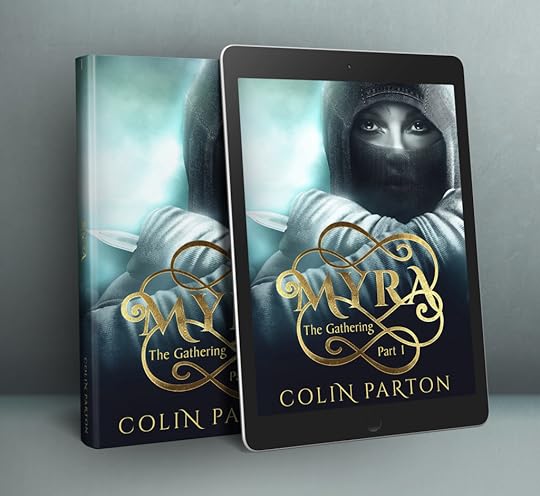 Myra: The Gathering, Part 1. - By Colin Parton (Me)
Myra: The Gathering, Part 1. - By Colin Parton (Me) Before you stick up your nose and leave this is not as narcissistic as me reviewing my own book. Not even I would have the gumption to do that.
This post is more about the writing and publishing process that I went through with this book.
Boy Meets GirlWell it wasn’t really that romantic. I had my first table top role-play experience with my friends at high school. Here I was, the new kid from Australia in the wintery north.
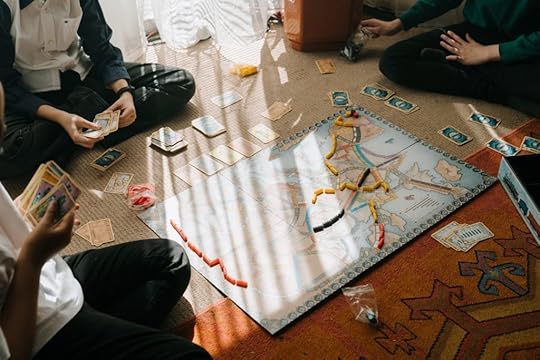 Photo by
cottonbro
from
Pexels
Photo by
cottonbro
from
Pexels
Well not really, we had recently moved to Guelph, outside Toronto. I had quickly made good friends with a group, for lack of a better word, nerds. And Myra was born.
It seemed like the most obvious choice in the world – like Myra had been waiting in the edge of my thoughts. When she stepped onto the stage – that was it – I was done. Bowled over.
For the next few years you could see me scribbling her story onto loose leaf pages in the halls. Over the years Myra had brothers and cousins join her. But nothing quiet touches the first character you play. I am her and she is me.
 Photo by
Min An
from
Pexels
The Pages Come Together
Photo by
Min An
from
Pexels
The Pages Come Together The disperate pages slowly came together to form a narrative. The first version of this tale was part of the whole it would become in Creative Writing – the elective I look in the last year of highschool.
Then I left Canada and started uni in Canberra. These tales were told and worked on throughout the following years but my focus had turned to the screen. I worked writing the words that others would say. I wrote the words that lead other directors down the garden path to show the audience waht I wanted them to see.
Short FilmThe writing never stopped. From in class to out of class. From one festival to the next there was always more stories to be told.
I think that Myra et al. were lucky that I was working on a student budget. I’m sure I would have tried my had at writing or shooting them into being if it hadn’t been for the medieval setting.
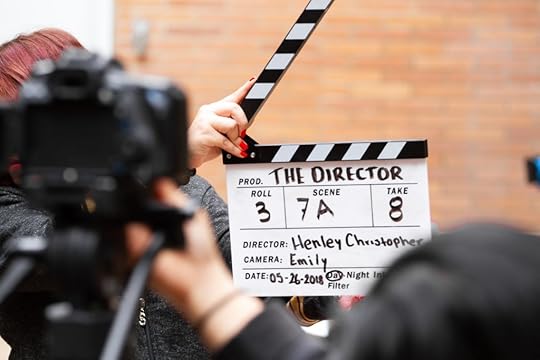 Photo by
Martin Lopez
from
Pexels
Feature Film Production
Photo by
Martin Lopez
from
Pexels
Feature Film Production After uni I tried very hard to get a feature made. But I knew that it wasn’t going to happen after seeing the money required for even a ten minute short. So I turned to the stories. I spent the next few years focusing on trying to sell the features I had written or getting short stories published. I didn’t have much luck with either.
To be honest I feel that I really gave the film gig a proper go. I think that if I had really wanted to I could have got on a plane and gone to the US. That was the next step. That’s what was needed. But I had a cushy 9-5 and no reason to jump.
Getting Above the SlushAt this point I had a draft of The Gathering (Myra, Snorri and Tarion) that I was happy with. It was doing the rounds of all the slush piles I could find. Many many many rejection letters and perhaps five years later I gave up on this path.
I decided to try to get an agent. So I took a similar tack to the slush piles – sending it everywhere. This is how I met Sandy. Sandy liked the work but she knew that I didn’t need to hear that it was good or that she liked it.
When she told me she would take the work on I was elated. She almost immediatly took the kiddie gloves off. I distintly remember that first phone call. “Well you can clearly write. And this is a well polished piece.”
 Photo by
RF._.studio
from
Pexels
Kill Your Children
Photo by
RF._.studio
from
Pexels
Kill Your Children This is an adage from script writing. So I was ready. Sandy had me re-writing a piece that I was sure was finished.
But I had done what I could so I was ready to try anything. A few months later we were done. Very little of Snorri or Tarrion had changed but Myra was a new beast and she held those boys together.
Then Sandy brought her powers to bare and got me manuscript under the noses of the heads of speculative fiction at some of the biggest publication houses the world has to offer.
Better Luck Next TimePublisher after publisher offer praise for the work but the wouldn’t publish. I was a new author and this is a glutted marketplace. Especially fantasy – I had no idea. Hit up Amazon or GoodReads next time you have a min. There is a ridiculous amount of scifi/fantasy.
So I got their drift. This probably wasn’t going to happen without something distinct to set me or the stories apart. This crystallised for me with the last rejection letter we got from Gollancz. We love the work but our books are full. I thanked Sandy for her time and went back to my 9-5.
9-5 Became Less CushyMe and my co-workers began to butt heads over more and more things. I stepped back and back until I had very little to defend. I gave in more and more and asked for one thing and my last ally took this from me. At this point a looked around at the position I had built from nothing over the ten years I had been in the role.
It was not what I remembered creating – not that change is bad – It’s that the reasons for the change need to still be present. The core needs to remain – the things that made it great. None of that remained so I promptly handed in my resignation and headed to a beach in Thailand.
Laying there reading some great books I decided I’d make a proper go of it. I was going to really hit the short story competitions. I was going to go for contract writer jobs.
BloggingBlogging quickly became a source of income for me. I was able to pick up jobs here and there but even on an ongoing basis it was never going to be the level of income needed to support someone.
But as a side hustle it was a good start. And I was gathering a base of readers that would, perhaps follow me into the next venture.
There are a few things about blogging that are truly terrible. The first is writing about things that you couldn’t care less about. Often coupled with this is huge research time. These two things made me really dread writing, something which I have never encountered before.
Money for NothingWell – not for nothing. For no labour. This is what I really wanted to achieve. It’s kind of the same idea behind investments that generate income. That’s what I wanted and needed my writing to achieve. Otherwise I’d be stuck writing an IT Blog for a pittance and never been able to live off that income.
So I decided that if The Gathering was good enough for me to land an Agent like Sandy and get such praise from publishers around the world surely I could sell some myself.
So I spent the next few months learning about self publishing and deciding the best way to go about releasing this story that had been with me as long as I can remember to the world.
And that’s it it’s done now. Myra is out there – you can buy or download a copy wherever you are on the planet. I know one guy that would be pretty stoked if you did.
Buy A Copy of Myra on AmazonThe post A Story About A Girl – 10 Years In The Making appeared first on The Writer Muses.
December 2, 2020
Two Families United Through Tragedy
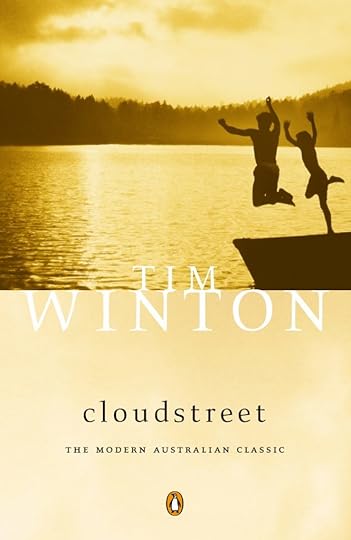 Cloudstreet - Tim Winton 8/10
Cloudstreet - Tim Winton 8/10 This iconic Aussie novel is an extremely well constructed story. This was the first Tim Winton novel I had ever read. I entered into knowing of his fame and the power this title carries in literary circles.
I try to put this baggage aside whenever I read things but I find it much easier to do with film as compared to the written word. This multi-generational novel follows the lives of two families, the Lambs & the Pickles. They couldn’t be more different but tragedy throws them together.
Compare & ContrastWinton introduces us to the two families early on. We see their true colours through total tragedy. Mr. Pickles injures his hand in machinery and one of the Lamb boys almost drowns. Both of these events are totally heart breaking as you see the immediate effect that it has on their respective families.
This setup ends up pushing the families to live together in the same old house, divided down the middle. The way the two families approach their new lives is really interesting and suffering and poverty affect both of them in extremely different ways.
The entire setup from tragedy to the families settling in together is well constructed and excellently told. A psychologist researching the effects of tragedy on families couldn’t have asked for better test subjects.
Racial PrejudiceI have to put my hand up here. I completely racial profiled the Pickles as an aboriginal family. Winton writes extremely well so that we don’t really know what the two families’ backgrounds are. I just made the call and read them as indigenous Australians.
I was literally shocked when towards the end Sam Pickles meets a real black fella near their house. They talk about the vote and from his response Sam cannot be aboriginal himself. I wonder where this came from for me?

I feel that it must be from the stereotypes that Australian literature, especially colonial, and media generates. The norm for us to see or read in the main stream is the impoverished under-achieving layabouts. Winton does brilliantly to challenge this stereotype by using all the same traits but writing them as white – and I fell for it hook, line, and sinker.
Meet The PicklesThe Pickles are completely lazy and do the absolute minimum to get by. Their tragedy is crushing, but all the other members of the family could pitch in and help out. They just don’t – apart from the daughter.
They get handed the house which they aren’t allowed to sell. Thank god because all the money would be gone on the horses and there would be no story. The mother is completely reprehensible. I have never felt so angry at any character ever. She hardly lifts a finger for anyone – even herself.
I also find them so alien myself as they have no drive and no goals. They accept whatever they have, whatever that may be. Sam Pickles is a likable chap. You feel sorry for him after he injures his hand. He is the one who comes up with the idea to split the house AND he works throughout the novel at the mint. Pity about his gambling addiction.
He does have great luck at the end but ends up in massive debt. I think this really needed to be their end. You couldn’t reward their slovenly behaviour through luck.
 Photo by
Tembela Bohle
from
Pexels
Meet The Lambs
Photo by
Tembela Bohle
from
Pexels
Meet The Lambs The Lambs’ tragedy – the mental impairment of their son through near drowning – is arguably much worse. They hit the ground running. They are just happy he is still alive – they see it as a miracle.
They are incredible entrepreneurial. As soon as they move into their side of the house they set up a garden and start raising animals. Self-sufficiency is their household motto. It isn’t too long before they setup shop – literally. They become a corner store for the neighbourhood. They sell produce bought at the markets to save the surrounding suburbs the trouble of the journey.
They even make their own goods for sale – like pasties and the famous ice creams. Their noses are to the grindstone their entire lives. Mrs. Lamb is the slave master who beats the drum – keeping them all in line. Even when she moves into the tent in the backyard. She is an amazing woman who saves them from poverty.
The Lambs are the family you would want in your corner in a pinch.
The ChildrenThe way Winton writes you see the families somewhat as characters themselves. The Lambs and The Pickles. All of the characters are understood within this family context. You sort of focus in on them as individuals but always with the filter of the family name.
All of the children are distinct and interesting. Winton gives us great stories of all of their lives. With the lives of the dual families being the underlying thread that weaves the novel together. Masterful stuff.
The SupernaturalThere are strong supernatural elements in the story – which seems odd right!?! Up until now I’ve described a suburban narrative of two families in modern Australia. I felt that these aspects were strange. They took the novel to a completely different place and gave it a very different feeling.
 Photo by
cottonbro
from
Pexels
Photo by
cottonbro
from
Pexels
They are almost dreamlike in that they would not be mentioned for chapters and chapters and then they would be the focus of the story. When they drifted away again they were a bit dreamlike and left me wondering: did that really happen?
There were three main standouts for me. The ghost like spirit ladies doing battle in the piano room of the house . The room that everyone but Fish dreads because it feels like death in there. Winton uses powerful imagery and you feel drawn into the spirit conflict taking place right before the families’ eyes.
Much more comical is the talking pig. Fish Lamb talks to the pig all the time – fine – lots of people talk to their animals – but the pig talks back.
There is an another section where Quick Lamb is out shooting roos and he has a vision of himself running out of the darkness into the spotlight and he kills himself. This is a full on scene that Winton paints for us.
The VerdictOverall I really liked the story. The construction of the novel was great. The characters were all interesting and their motivation was understandable. The multi-generational stories were well handled and all the characters were distinct.
I think that without the supernatural elements I would have enjoyed this more – which is weird for me because I love this sort of thing. It just felt very out of place. Like if a vampire moved onto Ramsay Street. I also really didn’t like the behaviour of a number of the characters but they were honest to themselves even if they were self-destructive. I completely understand the hype. This is a great novel.
If you would like to buy this book this is where I get mine:

The post Two Families United Through Tragedy appeared first on The Writer Muses.
November 28, 2020
Multi-Story Film Failure
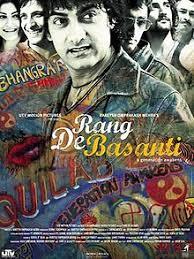 Rang De Basanti - Rakeysh Omprakash Mehra 3/10
Rang De Basanti - Rakeysh Omprakash Mehra 3/10 This is a really interesting film with some great performances. The creative team, led by Rakeysh Omprakash Mehra (Bhaag Milkha Bhaag & Delhi-6), are given too much leeway by the producers.
They try to frame, what could have been a brilliant film, with a haphazard back-story, which is interesting, but as a film it’s poor. Almost all of the problems with this film stem from the back-story.
Two Stories - Completely SeparateThe framing back-story is 1 hour 28 mins long. The second story is 1 hour 10mins. You can almost cut the film in two at this point. They are two completely separate films, and should have been.
The first story is about Sue, Alice Patten (Our Girl & Downton Abbey), making a documentary about revolutionary heroes from India’s past. This is an interesting concept of interlacing the actual documentary with the making of it. I’ll address the multiple issues that this film has in the next section
The second story is about the cast of Sue’s film taking up arms against corruption of the Indian government after the death of their friend Ajay Rathod, Madhavan (3 Idiots & Saala Khadoos). This film is way more interesting and way better written. It is tight and intelligent. The story hits all the right notes at the right times. If I was reviewing just this story it would be getting a very
Story IssuesThere is no opposing force to the story of Sue’s film making. Originally it is her TV studio when they cancel the film but she just continues on her own. There are then problems making the film but they are just that problems. A story needs to have a force of opposition that is actively trying to defeat our hero and Sue doesn’t have this.

The Prize and Price (explained in this article) are off for Sue’s story. This prize is: Sue gets to make a film. The price is: the lives of her cast. The scales don’t really balance here – you feel like they paid too much to succeed.
Care is another big issue here. The story is really just about Sue throwing a tantrum about her film getting cancelled.
There is also no resolution to the story. You guess that it got made because the completed product is interlaced throughout the first part of the film and there is a screening of the film. But because we now move onto the second, much more exciting story, this feels very anti-climatic.
 Songs
Songs It’s impossible to write about a Bollywood film without talking about the songs. The songs are mostly good as they fit the world. This is up until the scene with the arc de triumph at this point it doesn’t fit the world anymore. Whenever Bollywood does this it breaks suspension of disbelief and it is unforgivable.
There is a song at a temple that the characters are all singing so it fits the real world perfectly. This is how to fit songs into the story.
Action Well ChoreographedThroughout the film the action is well choreographed. It is easy to watch and understand what is going on. There is one scene that is particularly brilliant. Ramprasad, Atul Kulkatni (Natarang & Hey Ram), & Ashfaqullah, Kunal Kappor (Devadas & Meenaxi: Tale of 3 Cities) are captured and the action tells the tale perfectly.
Over The Top & AwkwardThe song at the temple is punctuated by a fly-over of fighter jets. They dust the colours of the Indian flag and this is a bit much.
There is a scene in a club after the screening the film which feels contrived and awkward.
The police brutality at the sit-in is supposed to parallel the colonial brutality but it misses the mark. That was then and this is now. I don’t need to give you a history lesson but we all know that there are different standards in the modern world.
Rang De Basanti's Other ProblemsThere are some sections of the film where a hand-held camera overlays the main film. This doesn’t add anything and it feels like Binod Pradhan (Bhaag Milkha Bhaag & Devdas), the Director of Photography, was saying: “Look at what I can do.” Not impressive.
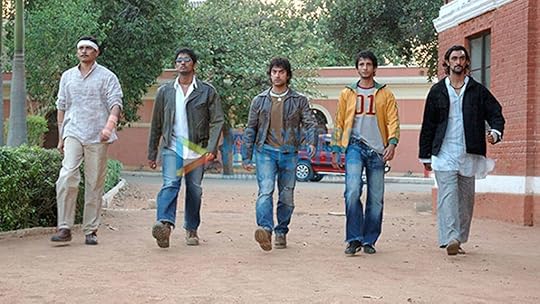
There is a scene set in an amphitheatre called the ‘Classroom’ that has water pooling in its lower levels. The characters both stand in it and jump from a great height into it, diving below its surface, so the depth of the water is variable depending on the action that the director wanted to happen. You cannot do this.
The post Multi-Story Film Failure appeared first on The Writer Muses.
November 20, 2020
Turn The Weirdness Up To Ten
 Neon Genesis: The End Of Evangelion - Hideaki Anno & Kazuya Tsurumaki 5/10
Neon Genesis: The End Of Evangelion - Hideaki Anno & Kazuya Tsurumaki 5/10 This film is a remake – reimagining – of the final two episodes of the TV Series Neon Genesis: Evangelion. As you can see from my review of the show those two episodes were a huge let down after what was a pretty spectacular series up to that point.
This film is really hard to look at without the TV show but I think we have to to be able to judge them separately on their own merits. While the last two episodes of the TV show are almost entirely internal – we don’t get to see what was happening – this is the external story of what happened.
My main issues with this film are to do with some big narrative stuff that is just not there. This article might help make my analysis clearer.
The StoryThe film is really weird. It addresses some very odd things in a very odd way. Essentially the basis of the plot is that there is are two groups attempting to kick-start the next stage of human evolution using two different methods. How those methods differ isn’t really addressed and it’s pretty irrelevant.

Shinji Ikari, voiced by Megumi Ogata (Yu Yu Hakusho: Fight for the Netherworld & Sailor Moon S: The Movie – Hearts in Ice), is our Hero. He stands opposed to these forces – but, as you will see, he doesn’t actually do very much.
 The Human Instrumentality Project
The Human Instrumentality Project The basic idea here, now stay with me, is to merge all humans into a single entity. This is the next stage of human evolution that the evil forces are attempting to bring about. So yeah, it gets very very trippy.
There are some incredible visuals but it all loses its power because of the lack of some big narrative pieces that we will delve into now.
Essential Story PiecesWhen you look at a great story there are five key elements. Two of those five are missing in this film. The first is The Price. This is the cost that the Hero pays to achieve their goal. Shinji pays nothing to achieve success. Sure he goes through a lot of teenage angst and self-loathing. But this isn’t even close to being enough.

He questions whether he deserves his prize – but this isn’t the same as paying something for it. You know those films you see and you just feel that it was too easy for the hero – this is one of those.
The second piece of the big five elements that is missing is Care. More correctly: Why should we care? Without this aspect you are not invested in the story. You need to care about the hero’s struggle – if you don’t, why would you want to watch it? This film’s answer to this question is best summed up in this statement: We all want to feel valued but probably wouldn’t join with all humanity and lose self to achieve it.
Yep, I was confused as well.
 Shinji Is Great At Doing Nothing
Shinji Is Great At Doing Nothing Ok, so three out of five isn’t bad I hear you say. Let’s flesh out the main twelve story elements and see how they do here.
There is only a single step of the Hero’s Journey that requires for the hero to do nothing. It’s aptly called – The Refusal of the Call to Adventure. After being faced with the adventure ahead of them the hero hesitates on the threshold. They question whether they should go on the adventure or not. Shinji nails this – He questions his right to succeed at all.
Throughout the majority of the film Shinji is a bystander he has no agency and just watches things happen. Even at the most important part of the film where the hero decides to go on the adventure he just stands by as his EVA – battle mech – takes control of itself and does what needs to be done.
Throughout stages six to ten of the Hero’s Journey Shinji is a bystander. Only right at the end where it is Shinji who has to be the one to decide to merge all humans or not, does he do something. You are almost caught wondering – who is this guy. Not a great feeling for your lead in almost the final scene.
Is It Better Than The Original EndingThis is really hard to answer. The best way to explain it is to address what I have touched on already. Internal versus external. The TV show deals with this decision entirely internally. In Shinji’s mind. We don’t even know what is really happening in the outside world apart from a single glimpse of everyone dead.

The film shows us everything, from some fantastic fight scenes to an epic battle-mech ritual to bring on the Human Instrumentality Project. The film feels like we are just watching an explanation of events. It’s like a documentary of the end of the world. Which would be fine if it wasn’t trying to parade itself as a story.
So, both are terrible, but the film is worse because at least with the TV show we have some great story telling techniques used and Shinji and the other characters have tons of agency.
The post Turn The Weirdness Up To Ten appeared first on The Writer Muses.
November 14, 2020
Battle Mechs Fight Space Aliens From Another Dimension
 Neon Genesis: Evangelion - Hideaki Anno 8/10
Neon Genesis: Evangelion - Hideaki Anno 8/10 This groundbreaking TV show is so hard to describe. On one hand it is what the title says – battle mechs – but on another it’s about what it means to be human. In some ways Hideaki Anno (Evangelion: 3.0 You Can (Not) Redo & Love & Pop), nails this weird juxtaposition but in others he completely misses the mark.
We follow Shinji Ikari, voiced by Spike Spencer (Redline & Supa Pirate Booty Hunt), as he grapples with the normal adolescent stuff overlaid with piloting one of the robots to save humanity. The story also follows his attempt to deal with the deeply fractured relationship with his father and the question of what it means to be human himself.
Start Late & Leave EarlyThis is a mantra of writers when looking to get better pacing out of their scripts. The idea is that you want to start as far into the story or scene that you can and leave as early as you can. The rest is just filler. The creative team do not disappoint here. Episode one opens well into the war with the angels. There is zero back story. This is the ordinary world. We are left guessing and trying to piece together what is going on with the titbits we are tossed.
There is reference to Three Children and the Third Children (I think that the grammar is off intentionally) and then we meet Shinji our would be pilot who decides to fight the angels even though he has never been in a mech and has just been chosen – hesitant hero – you betcha.
It is not until episode 14 that we get all caught up when they re-cap all of the previous angel attacks. Or are we all caught up? Read more in the sections at the end about the Overarching Story and the Meta Plot.
Powerful EnemiesAt the start of episode 2 Shinji has just jumped in his mech for the first time and our blood is pumping with him – ready for a big fight. This is why we started watching this show right? And bam the fight is over – Shinji lost. End of story.
We should have expected instantaneous defeat when all the technicians were surprised when Shinji could make the machine walk. But talk about anti-climatic.
Then the rest of the episode happens along a completely different story line and – BAM – we’re back in the fight. And just kidding Shinji didn’t get smoked – HE WON!!! This is some beautiful editing and storytelling at its best – meeting expectations in unexpected ways.
The power of the angels is re-enforced throughout the story from the direct attacks to the worldwide destruction we learn about later on in the show.
The Eva Pilots The Rei EnigmaWe meet Rei Ayanami, voiced by Amanda Winn Lee (Blue Seed & Persona Q), early on in the series and she is enigmatic from the start. She is the First Child and pilots an Eva alongside Shinji.

She is portrayed as a submissive schoolgirl and is completely dead-pan. This leads to some extremely hilarious and shocking moments with some of the things she says.
In episode 23 we learn that Rei is a clone and that NERV has almost infinite copies of her ready to go. It may be worthwhile re-examining the fights and Rei’s survival because of this fact – it is possible that she did actually die more than once. This also makes Rei valueless to NERV.
In this same episode we start to see more of the real Rei. She says: “I’m probably the third one.” Which is heartbreaking if you think about it. She knows she is a clone and therefore valueless so she must question the sincerity of Gendo’s affection.
She also comes out with an odd comment in this episode about the EVAs and Adam: “We found God [Adam] and were punished and made god in our image [the EVAs].”
 Asuka's Problems
Asuka's Problems Asuka Langely Soryu, voice by Tiffany Grant (Gekijouban Fairy Tail: Houou no miko & Tokyo Magunichudo 8.0), is a headstrong Eva pilot. She is the Second Child. She is from the US and has all the stereotypical traits to match.
She is unchangeable throughout the series with her single goal to be better than the other pilots. Her single goal and two-dimensionality lead to some great moments.
Episode 22 reveals the real Asuka to us. We see the reason she wants to be the best and why she wants everyone to like her. And when she can no longer interface with her EVA she has nothing left to live for and has a complete mental breakdown. Asuka’s transformation is handled with skill and the creative team take the time to let us wallow in her despair.
Shinji's ProblemsRei and Asuka’s issues are nothing on Shinji. He is an emotional wreck. We see him break down time and time again. This stems from the extremely poor relationship that he has with his father, Gendo.

The relationship between father and son is strained from the word go and I felt it very odd that Shinji didn’t live with Gendo. Instead he moves in with Misato Katsuragi, voiced by Allison Keith (Evangelion: 2.0 You Can (Not) Advance & Full Metal Panic!).
Misato becomes his guardian and their home life is odd as Misato is his superior on base but is completely unreliable at home – gets drunk all the time. Misato is one of my favourite characters in this show. She is dogged and great at her job. She is powerful and emotional. She is supportive of Shinji and also lets him down. She is human in all her contradictions.
In episode 4 Shinji runs away from the program – the stress is too much. But he is brought back – he must defend humanity. After this Misato starts forcing him to share his feelings with her – realising that he is just going to explode if he doesn’t. This leads to some fantastic moments and their relationship is brilliant.
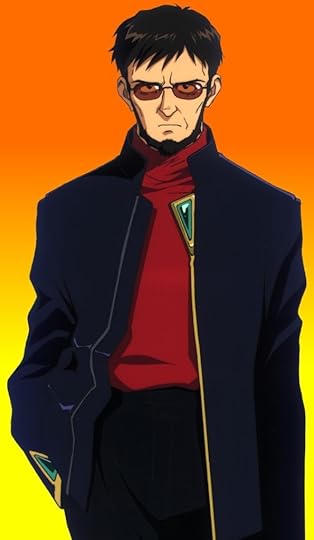 Strange Relationship With His Father
Strange Relationship With His Father As touched on previously Shinji and Gendo have a bizarre relationship. It is cold and tense, to begin with this feels that it may be because of the power differential of their roles at NERV. All of their interaction is under the guise of these roles – so perhaps there isn’t much of an opportunity.
This doesn’t last long. From episode 5 Shinji starts calling Gendo out directly. Oddly enough Rei is the only person who takes real offence to these outbursts. She idolises Gendo and cannot comprehend how Shinji cannot she the man she can. Her reaction is doubly weird – in taking offense – when she let Shinji grope her earlier in the episode without hardly batting an eyelid.
There is an elephant in the room – literally – and perhaps it is this that is driving Gendo’s plans and his relationship with his son. In episode 24 we learn that he has a growth on his hand – with an eye and he regularly talks to it. We thought he was talking to himself up until this point.
Machines Or CreaturesFrom the word go we know that the EVAs are not your normal Mechs. There is an integration process between the pilots and the EVA, hinting that that are sentient themselves as they can reject integration. We see this with Asuka later in the series. The pilots have to be immersed in an embryonic soup called LCL to be able to integrate.
In episode 2 we get a glimpse of this physically at the end of the episode where they appear to be living creatures – which leaves you thinking at this point: What is going on? There is a fantastic scene in episode 8 where Shinji loses control of EVA 1. The EVA goes completely berserk. The way it moves changes from robotic to bestial. It is fantastic animation.
In episode 15 we meet Adam (more below) nailed to a cross deep beneath Central Dogma at NERV HQ. It appears to be producing LCL. He resembles an angel. Interestingly Misato refers to it as an EVA when she first sees it raising the question: Are all the EVAs angels?
Even more interesting here is what the EVAs represents story wise. At any one time it is two entities – the EVA itself and the pilot dominating it. In the case of EVA 1 it is three entities. The third entity is EVA 1 is Shinji’s mother who merged with the EVA years ago.
EVAs VS AngelsIn episode 16 the EVAs are confirmed to be copies of Adam by the head of the science division at NERV. Interestingly Misato immediately questions the validity, not believing that they could all be copies of Angel 1. More importantly now she asks the question that has been hinted at since episode 1: What is NERV going to do once all the angels are defeated?
In episode 19 we see, for the first time, the angel ‘heart’ pieces present in all the EVAs. In the same episode EVA 1 goes completely bestial – down on all fours. It feasts on the fallen angel like a predator. It is attempting to incorporate the angel’s S drive into itself. The vision of its head perking up at a noise in the distance and its eyes turning from white to red is haunting.
Great Filmic MomentsThere are some fantastic moments throughout this show. Some of these have already been talked about above. The first fight with Shinji is great at building our suspense.

In episode 4 after Shinji is kicked out by Misato he goes to board the train while we know that she is rushing to stop him. The way this is animated makes us wait until after the train has left for us to see him standing on one side of the platform and her on the other, re-united. Masterful.
In episode 20 EVA 1 attempts to merge with Shinji. This is an entirely internal process. I mean all that there is to see physically is the LCL sludge and Shinji in his primordial state sloshing about – not very entertaining. But internally this struggle between Shinji and the EVA and his mother – wow. Now that puts a spin on the enticements that the EVA offers him. The animation captures this spectacularly in a way that live action probably would have been unable to achieve.
 Symbols Of Faith
Symbols Of Faith I ummed and ahhhed about writing this section at all but the show is littered so heavily with religious symbols that I couldn’t just ignore them. The first thing are the names that are used. Angels for the creatures that are attacking the humans. They are wholly other-worldly and could actually be angels after we learn what is really going on at NERV and with the secret council.
Adam as the monstrous first angel that brought all our suffering with the first impact – huge reference to the fall. I would say that the angels and Adam have much deeper meaning than the names the humans chose to give them.
Misato’s jewellery throughout the show is always of Christian iconography. There are references to the Angel of Death in episode 8 after EVA 1 goes berserk. The seventh angel is literally the ying-yang symbol.
In episode 14 Gendo reveals that the events are all as prophesised in the Dead Sea Scrolls – which is obviously not correct but cool reference none-the-less.
Slow Reveal Of The Overarching StoryThe way that we are brought in on the story is well done. As discussed in the intro they throw us in the deep end. We have the Council of Seels drip feeding us information through their discussions with Gendo, in the early part of the story, and amongst themselves later on.
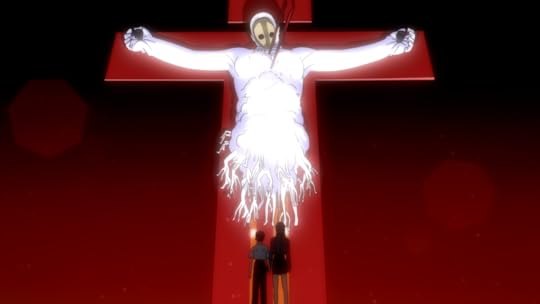
Episode 3 is a history lesson at the pilots’ school about the second impact where a meteor hit the Antarctic and almost wiped out humanity. In episode 6 we learn that this was actually Adam – the first Angel – and the whole story was a cover up.
Episode 21 gives us the full story. We get an explanation of how the EVAs came to be. How Adam fits in. The council’s position is explained and we get the back story of how Gendo rose to power at NERV. So much information in this episode and it impressively told in only 20 minutes.
 The Secret Council & The Meta Plot
The Secret Council & The Meta Plot As discussed above the story is brought to us slowly and when you get it all you will be glad they did – it would have been such a huge amount of exposition even I probably would have tuned out. We get early on that NERV is working to some overall plan put in place by the Council of Seels.
We first meet them in episode 2 and it is revealed that they are the power behind NERV and about something called the Human Instrumentality Project. They order Gendo not to push back the timetable due to the angels arrival. This leads to the question about what the EVAs were for if not to fight the Angels?
Every meeting raises more questions – What is the end goal? There is also a power struggle going on between the Council and Gendo.
In episode 22 there is an angel attack that the EVAs cannot engage because it is attacking from orbit. This forces, or allows, Gendo to use the spear of Longinus. They defeat the angel with this weapon but there is no way for them to retrieve it. While this is very exciting on the surface what is much more interesting is what is happening behind the scenes in regards to these decisions. First, the spear of Longinus was the only thing holding Adam at bay, speared to the cross under NERV HQ.
By having to use the spear they have to release Adam, which changes the time frame and perhaps the whole end game of the Human Instrumentality Project. Perhaps, with the back story of Gendo now revealed, this was his plan all along.
In episode 24 the fifth child arrives, many suspect that he is a spy for the council. He meets Adam and calls it Lilith and says ‘Ah, so that’s your plan’ – I wish he would let us know what the plan is.
The EndEpisode 25 opens with interesting self-interrogation of the pilots. Then everyone is just dead. There is talk of merging all hearts. From what I gathered from the mess that these last two episodes are: The message appears to be that the world influences you and you influence it so you need to have certainty and faith in yourself.
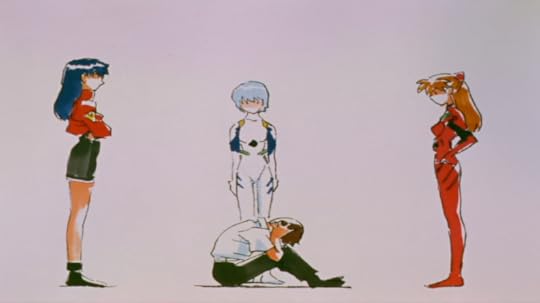
And then it kinda just ends. There is no explanation about what actually happened or what the spear was for (perhaps just to trap Adam/Lilith). I can see why this ending was re-made. This was such a let down.
 Things That Don't Work
Things That Don't Work There is very little in this show that is an issue for me. It hits all the right notes. It balances well between been just another mecha and existential drivel. I say drivel because that is really what the last two episode are. Up until this point we’ve been wondering what the go is with the EVAs and the angels. What is Gendo’s plot? What is the Council’s plot?
None of this gets answered. Instead we are left with some airy messages. This could have been super tight and sweet but I guess sometimes people miss the mark. Also, there is a sex scene with Misato at the end of episode 20. It just goes on too long. You know the feeling that you have when you watch sex scenes in a movie with your parents? Well this had those sort of vibes – just because it went on so long it became awkward.
The post Battle Mechs Fight Space Aliens From Another Dimension appeared first on The Writer Muses.
October 27, 2020
Blind Lead Shoehorned Into A Story That Doesn’t Work
 Andhadhun - Sriram Raghavan 1/10
Andhadhun - Sriram Raghavan 1/10 This film follows Akash, Ayushmann Khurrana (Vicky Donor & Article 15), a blind pianist through his daily life. He becomes entangled in a murder and gets more than he bargained for in the scam he has been running for years.
Huge Story IssuesThere are two main ways you can view the plot of this film. One is the overall plot of Akash’s blindness, or lack thereof. The second is of the murder. Neither work.
If the blindness is the main plot we miss the first five steps of the heroes journey as they all occur before the film starts. The main issue with this is that we fail to gain an understanding as to Akash’s motives behind pretending to be blind. We are given some indication of the benefits – cheap rent and people helping him – but these are merely benefits. We need to see the reason why. Because we don’t know why we don’t know why we should care.
If the story is about the murder then the Catalyst and Crisis of the film occur in the same scene – the cleaning up of the murder. All the scenes up until this point don’t inform the murder at all and are merely character building for Akash. Either way the plot doesn’t work.
There are points where we have to care about Akash and his situation. For example, he is tricked into a situation where he is going to have his liver harvested and left to die. He then sets up the same fate for Simi, Tabu (Haider & Drishyam). The situation is horrible for both simply because organ harvesting is terrible. The fact that we are supposed to support Akash’s decision to put Simi in this position is untenable when we don’t know why he is doing what he is doing overall – I mean we get that he is trying to get out of the situation he is in now but we have to care about the overall motives to support this decision and we just don’t.
The Reveals Are Well HandledWe learn that he isn’t blind early on after he wants to see the girl. He also drops his glasses and picks them up with ease – the neighbour’s kid sees this. These reveals are well handled and well shot.
Songs Are Part Of The Story & Then They Aren'tA huge problem that I often have with Bollywood films is that they are bloated and long because of songs that are just included because they are Bollywood films. The songs often have nothing to do with the story and have no tie in to the world we are in. It is inexcusable to break suspension of disbelief in this way for no reason – not to further story etc.
Andhadhun is very different in this regard. The songs are woven into the story and are important to the plot. The weaving in is well done, through the characters looking at YouTube and Akash’s job as a pianist.
Then, I guess because we hadn’t reached our quota yet, there is a song in the hospital which doesn’t do either of these things – it is jarring and off-putting.
Blindness Leads To Seeing Some Great ThingsOne of the best scenes in this film is where Akash has been hired as a surprise to give a personal concert to a murder victims wife. Akash arrives at the scene shortly after the murder and while he plays they clean up the scene of the crime – even wheeling the body past him. He then goes to the bathroom and sees the murderer hiding out in there.
 Photo by Jeremy Lishner on Unsplash
Photo by Jeremy Lishner on Unsplash Akash is then faced with the choice of doing nothing – because they think he couldn’t see anything or going to the police and giving up his charade. This would be much more powerful if we knew the reason why he was pretending to be blind in the first place. There is an interesting plot development here in that the head of the police station he goes to report the crime to is the murderer himself.
They do eventually cotton on that he isn’t blind and Sami comes after him and blinds him for real. This is brutal. Then in the final scene, many years later, it is revealed that he can see again even though he is still doing the same blind routine. In story terms this is the worst thing they could have done. It means that the hero hasn’t gained anything from his journey and returned to the same starting point – he is doomed to repeat the journey again. They also do not explain how his sight was regained.
The Defence Of AkashAs a hero Akash is not great because of all the things covered already. There are some things that are discussed about his motives. Of particular interest is the idea that is put forward that blind people play better music because their other senses and more focused without sight.
This holds water until we realise that the blindness is just a ruse. How can pretending to be blind have the same effect?
He does get his comeuppance when he blinded for real by Simi but this hardly seems justifiable in story terms to balance his fake blindness.
Lost In TranslationThis film doesn’t translate to a foreign audience very well. There is too much detail that is unknowable and irrelevant. For example there is a big deal made of Akash getting a room because he is blind for only 500 Rupees. I’m guessing the point is that this is very cheap but how cheap, who knows?
There are also a lot of irrelevant titles of locations – perhaps this was relevant for the story but I certainly wasn’t pulling out a map to see where they were.
There were also 2.15 minutes of titles at the start of the film. The bit that was especially irksome was the Special Thanks To section and the list of all the movies ViaCom had made – all before the movie starts.
If you would like to buy this film or any others these are the places I buy mine from: [image error]The post Blind Lead Shoehorned Into A Story That Doesn’t Work appeared first on The Writer Muses.
October 24, 2020
Innocent Lies Destroy Lives
 The Hunt - Thomas Vinterberg 8/10
The Hunt - Thomas Vinterberg 8/10 The hunt is a gripping and intense film that follows the plight of Lucas – Mads Mikkelsen (Rogue One & Hannibal) after he is accused of child molestation. The story is riveting to the final scene. Mads deserved the Best Actor award at Cannes.
I’m a huge fan of Mads’ ability to play such a variety of roles but it is here we see his full skills brought to bear. The screenplay is second to none and we have Tobias Lindholm (A Hijacking & R: Hit First, Hit Hardest) and Thomas Vinterberg (Festen & Druk) to thank for this.
What is so important in this film is that every word and action is believable and we can understand the motive. If suspension of disbelief was ever broken the entire film would come crashing down.
Not For The Faint HeartedIf you hadn’t already guessed the subject matter of this film is not for the faint hearted. This is made doubly clear when there is full frontal male nudity in the first scene.
The ongoing and sometimes graphic description of child molestation will definitely not be everyone’s cup of tea. But this is never gratuitous. Every scene and story has an important role to play in the overall narrative. Just a word of warning.
Klara's PowerKlara, Annika Wedderkopp (Man Divided) is one of the children in Lucas’ class at the local school. She has a crush on him – though she is so young she doesn’t really understand what any of these things mean. The whole story begins with an innocent lie to the principal of the school.
What is key in this film is Klara’s motives and believability. Klara professes her love to Lucas and Lucas rejects her advances but the doubt has already been placed in the mind of the principal. Klara eventually comes clean to her mother later in the story – but the horse has already bolted. Her mother refuses to believe her now even though she was hanging on every word of the lie.
Much later on in the film Klara is having a dream about Fanny (Lucas’ dog – which she often visted). Her father is watching her from the shadows of the doorway. Klara wakes and sees the shadow and says ‘Lucas?’ – because of the association of the dream of Lucas’ dog. This however, seals Lucas’ fate in the mind of Klara’s father. Masterful moments like this are used to illustrate Klara’s power over the town.
Unconscionable ConductGrethe, Susse Wold (Unit One & Charles’ Aunt), is the director of the preschool. She is the first to doubt Lucas – and give Klara’s lie a life of its own. She then brings in an investigator who puts extremely leading questions to Klara – concocting a story in her mind – and Grethe sits by lapping it up.
There are two further steps she takes that are completely inexcusable. She calls Lucas’ ex-wife and tells her about the allegation – putting in doubt Lucas’ ability to see his son. She also presents the allegation to the parents of the school as fact.
I understand where her motives come from – wanting to protect the children – but the witch hunt that ensues is largely her fault and the steps she takes all but destroy Lucas’ life.
 Photo by
cottonbro
from
Pexels
The Child Is Key
Photo by
cottonbro
from
Pexels
The Child Is Key Klara’s every move become the focus of analysis by everyone in the community. After the accusation she continues to visit Lucas to see his dog. At this visit she flinches slightly when Lucas is there. This gives Lucas’ girlfriend reason to doubt Lucas. Klara realises, to some degree what she has caused, and trying to fix things is nigh impossible for such a young child.
Lucas has the child at the front of his mind – always. Even as the town turns on him he doesn’t ever turn on Klara. He is concerned about the impact that all of this will have on her.
There is an incredible scene towards the end of the film after Lucas is exonerated and they are all gathered for a hunting party. He sees Klara for the first time for a long while. Lucas realises all eyes are on this interaction – and understands how important it is in terms of how the community views him. But rather than protecting himself and not engaging he is concerned for Klara. He doesn’t want it to be awkward for her given how bad she feels so he is lovely to her and comforting – makes her feel ok – despite the consequences for himself.
Turn Up The TensionLucas is arrested and after extensive questioning the police release him – they cannot charge him – there is no evidence. This is the point where the community is the most terrifying. They are certain of Lucas’ guilt and now that the police have released him they feel that they have to take the law into their own hands.
Fanny, his dog, is murdered. The irony here is that it is likely to upset Klara just as much as it upsets Lucas. Lucas is ostracised and beaten.
The final scene when they are out on the hunt someone shoots at Lucas and as he turns we see their silhouette in the sun – it could be anyone. Lucas’ life has changed forever. There will always be someone who believes he did it.
If you would like to buy this film or any others these are the places I buy mine from: [image error]The post Innocent Lies Destroy Lives appeared first on The Writer Muses.
September 12, 2020
Hidetora’s Descent Into Madness
 Ran - Akira Kurosawa 5/10
Ran - Akira Kurosawa 5/10 This is the epic tale of great lord Hidetora Ichimonji (Tatsuya Nakadai – Harakiri & Yojimbo) ceding power to his sons. He has accumulated great wealth in his lifetime and no longer wants the troubles of leadership.
The story follows as each of his sons take their turn in betraying him often at the behest of Lady Kaede (Mieko Harada – Dreams & Lullaby of the Earth). Kaede is a powerful force but it is Ichimonji steals the show.
Taro & TangoThe only two people who remain true to the old lord throughout are his son Taro (Akira Terao – After the Rain & Half a Confession) and his vassal Tango (Masayuki Yui – Kagmusha & To End All Wars).
Taro is banished right at the start for refusing to accept his father’s abdication and dies at his father’s side after coming to the rescue.
Tango remains at Hidetora’s side throughout and suffers almost as much as the lord for all the terrible choices Hidetora makes.
Taro and Tango are poorly rewarded for their loyalty.
Beware the Woman in RedLady Kaede is a truly evil force. As soon as the abdication becomes certain she plays the brothers against each other and against Hidetora, even if they are happy for him to stay with them to start off with.
She refuses to allow the old lord’s kingdom survive and would rather see it burn than any of them rule it – and this is exactly what she gets. She is an intelligent manipulator of her husband and the vassals around her.
One of her conquests is killing of Lady Sue. There is a great scene after the generals return after failing to kill Sue to which Kaede responds: “Until I have her head you will never see me again.” Part of me was thinking that this would probably be best for all involved – unfortunately it was not to be.
The Great Lord & SuccessionWe realise very early on that ceding power isn’t the done thing. Hidetora’s first mention of it is what leads to the falling out with Taro. This is a really interesting development story-wise.

It is also very odd how the actual succession plays out. It is almost as if Hidetora doesn’t realise what the order to succeed actually means until he is signing the order.
However, there is a nice scene where he immediately calls out Lady Kaede’s treachery following the succession and his expulsion from the first castle.
The Steps To InsanityAs he is slighted by each of his sons his looses part of himself – until he himself is banished. Each son in turn refuses support. He travels from castle to castle that until days earlier were his.
What I find so bizarre is that things that seem very clear to an audience appear to be missed by the old lord. Even when the truth of his third son’s aid is right in front of him he refuses to accept the truth and heads to his ill-fated third castle.
The culmination of the Hidetora’s failure is when he cannot find a sword to commit suicide as the third castle falls. Slipping between madness and sanity is brilliantly portreyed throughout the end of this disturbing narrative.
 The Verdict
The Verdict The film has some really nice moments and some great acting. The problem is that this all hangs off a story structure that doesn’t make a lot of sense.
The audience sees, time and time again, a clear path to salvation. Yet, we are not given any reason as to why Hidetora takes the actions he does.
My gut feeling is that aspects of Hidetora’s motivation do not translate well from a Japanese audience to a western one. Perhaps there are things to do with honour that are clear to the Japanese audience that make Hidetora’s action make sense. Without this background I cannot understand this film.
If you would like to buy this film or any others these are the places I buy mine from: [image error]The post Hidetora’s Descent Into Madness appeared first on The Writer Muses.
June 7, 2020
The Screenwriters’ Favourite Film – But Should It Be?
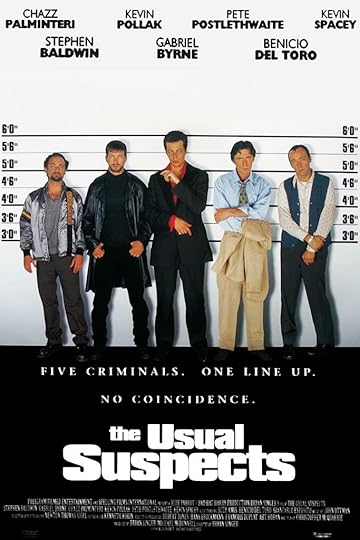 The Usual Suspects - Bryan Singer 8/10
The Usual Suspects - Bryan Singer 8/10 This film has all the hallmarks of a great film. The story is tight with little hints dropped throughout for the audience to figure out what’s going on. Christopher McQuarrie (Mission: Impossible – Fallout, Edge of Tomorrow) won the Oscar for best screenplay because of how great the script is.
You have to be watching everything very closely from the word go to be able to pick the twist. And hats off to you if you are able to call it. I’ve watched this film a number of times now and even knowing its coming I cannot put together the pieces to make the argument for it.
We are also treated to some great performances from Kevin Spacey (House of Cards, American Beauty) as Verbal. He rightly won an Oscar for his performance here. Another great performance is from Pete Postlethwaite (In the Name of The Father, The Town)as the enigmatic Kobayashi – he was also nominated for an Oscar for his performance here as well.
Ok given that this brilliant film is based around a spectacular twist if you haven’t watched go do so – read on at your own peril.
Double PlotThe brilliance of this film lays in that there are actually two plots occurring at the same time. One is the one on-screen plot but there is another that is happening off-screen.
To put so much work and effort into something that the audience never sees must have been tough. But it pays off in spades.
The plot on-screen is fake – it is entirely flashback – or so we think. The one occurring off-screen, that we only become part of in the final scenes, is the real story.
There is a huge problem here. We are invested in a fake narrative and are left wondering how much of it actually happened. I’ve tried to go through the entire film a number of times trying to figure out what is real and what is not – I’ll include this at the end – but I don’t think it aids the discussion much and leaves us with more questions than answers.
The problem with following a fake story is that when we are told that none of it was real we feel cheated – and we should. We cared about characters and the struggles they went through – we were there when they succeeded.
What this means in narrative terms is that the prize and the price are lopsided. Kaiser gets too much without much of a cost. But when you think about it, and how now the entire police force knows what he looks like and keeping his identity hidden has been his life-long goal, it seems ok.
Mind Blowing Filmic TechniquesThis film uses some really neat tricks throughout. Nothing exemplifies this like the opening scene where Verbal is talking to the police. You aren’t even sure he is talking to the police at all.
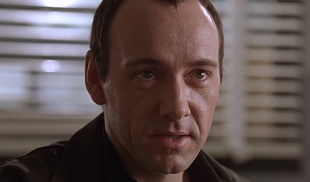
This questioning kind of feels a bit awkward and poor at the time but when you then put it together with everything it is masterful. From the very onset we are questioning what is real.
Fishing For The Red HerringDean Keaton (Gabriel Byrne – In Treatment & Vikings) is the perfect Red Herring. The police are so keen to get Keaton they don’t really care about anything else.
They are so blinded to everything else they hand Verbal immunity like its nothing. But the film does so much more than this. It makes us think Keaton is the hero – we are rooting for him to succeed – even though we know he is going to die. This is a really hard thing to do – make your audience care about a character that they know is going to die.
The real and fake tie together of the one character is fantastic and it makes us run with the cops in understanding why they want Keaton and give Verbal immunity.
Two Endings In OneWhen the cop presses Verbal about why he didn’t help when they were taking the ship he breaks down and cries, he plays on his disability. Ultimately he serves up what the police want – ‘It was Keaton all along’.
But this isn’t the way that the cops wanted it to end. They wanted him caught and guilty. Not dead.
Powerful Off Screen CharacterKobayashi is Kaiser’s assistant. He delivers a powerful performance but he is hardly ever on screen. The main scene that he is in is the reason Pete was nominated for the Oscar. He brings in files that Kaiser has on each of the characters and why they have to do what Kaiser says. It is a fantastic build up and delivered beautifully.
This scene is made even better by Verbal’s reaction – he tries to push them further over the edge in case they hadn’t already made up their minds. Brilliant interaction even though Kobayashi and Verbal know each other very well they do not let on at all.
Why Does Verbal Say Anything?My biggest issue with this film is this question. I cannot answer it and because I cannot answer it I am happy to give this film eight out of ten. But let’s just run through my thoughts on it.
There is no cost to him either way. He already has the immunity deal before he starts to talk. The argument could be made that by giving the cops what they want on Keaton he takes the heat off himself. But this doesn’t make sense because he already has immunity.
By saying nothing as they accuse his ‘friend’ he looks guiltier. This is a huge slip up – Verbal almost gives his game away in this single reaction.
Perhaps everything we see in the film is false – but there is no way to know for certain as it is all Verbal telling the story. We know some of the big events must be real (the line-up at the start; the hit on the taxi service; the death of Fenster; the attack on the ship) because they are corroborated by the police.
But if Verbal doesn’t say anything we don’t have a film – so perhaps there is the reason.
If you would like to buy this film these are the places I buy mine from: [image error]The post The Screenwriters’ Favourite Film – But Should It Be? appeared first on The Writer Muses.



